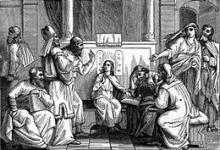Judaism is a religion of scholars and has been since the beginning. Many great thinkers occupy positions of the utmost honor and respect today, but once in a while certain sages attain a sort of super-stardom in Judaic philosophy. Perhaps no scholar in Jewish history is more well-known and popular than a quasi-mythic figure named Hillel.
Little is known about Hillel's origins and his greatness has invited a large amount of obvious invention. Some accounts have him living for 120 years and serving as the originator of many famous phrases such as "Do unto others as you would have done unto you." These claims serve as place-holders for a lot of cultural material and a means of making an ideal thinker into a hero. The reality, what little we have, is that a man named Hillel lived in and around Jerusalem in the time of Herod (the Roman occupation) and he contributed greatly to the Jewish philosophy of the time.
Hillel's family background is unknown. There are occasional references to his grandchildren and his brother, a merchant. Hillel himself made a living as a woodcutter. Like many notable scholars, he began his study later in life. It is commonly accepted that he began studying in some of the higher schools of Judaic law at around age 40. He was involved with the development of the Talmudic commentaries and the expansion of the Mishnah, the rabbinic laws that further expounded on the Torah.
Essentially, Hillel was a lawyer of sorts. He interpreted biblical rules and customs through the lens of modern concerns and the human experience. The stories we commonly tell of Hillel posit him as a warm humanitarian, a lively figure who promotes a faith of increase and joyful learning. Fables place Hillel in the role of a willing teacher and a consummate innovator, often in civil opposition to his hard-line contemporary Shammai.
All of this mythologizing points to one reasonable conclusion. Hillel operated in a time of great socio-political change in the Roman province of Judea and in the Jewish faith. It was close to when the Diaspora in which we still live began and when the spiritual leadership of Judaism shifted from the priesthood to the rabbinic scholars. Hillel has come to represent the rabbi in ideal, so it only stands to reason that he would be painted as a more sympathetic figure than his contemporaries. Our interpretation of Hillel says more about our own modern values than what the man himself actually professed.
So, if Hillel is the closest thing modern Judaism has to a spiritual champion, what does that mean? It means that our civilization took a stance approximately 2000 years ago to pursue a flexible rendition of the law, a gentler, more humanitarian approach than had originally been the case. As we moved away from the practices of sacrifice and tithing (i.e. the priests of the Cohanim), we followed the fledgling rabbis into what would become the current trajectory of Judaism. The soft politics of heart-and-mind philosophy won out.
